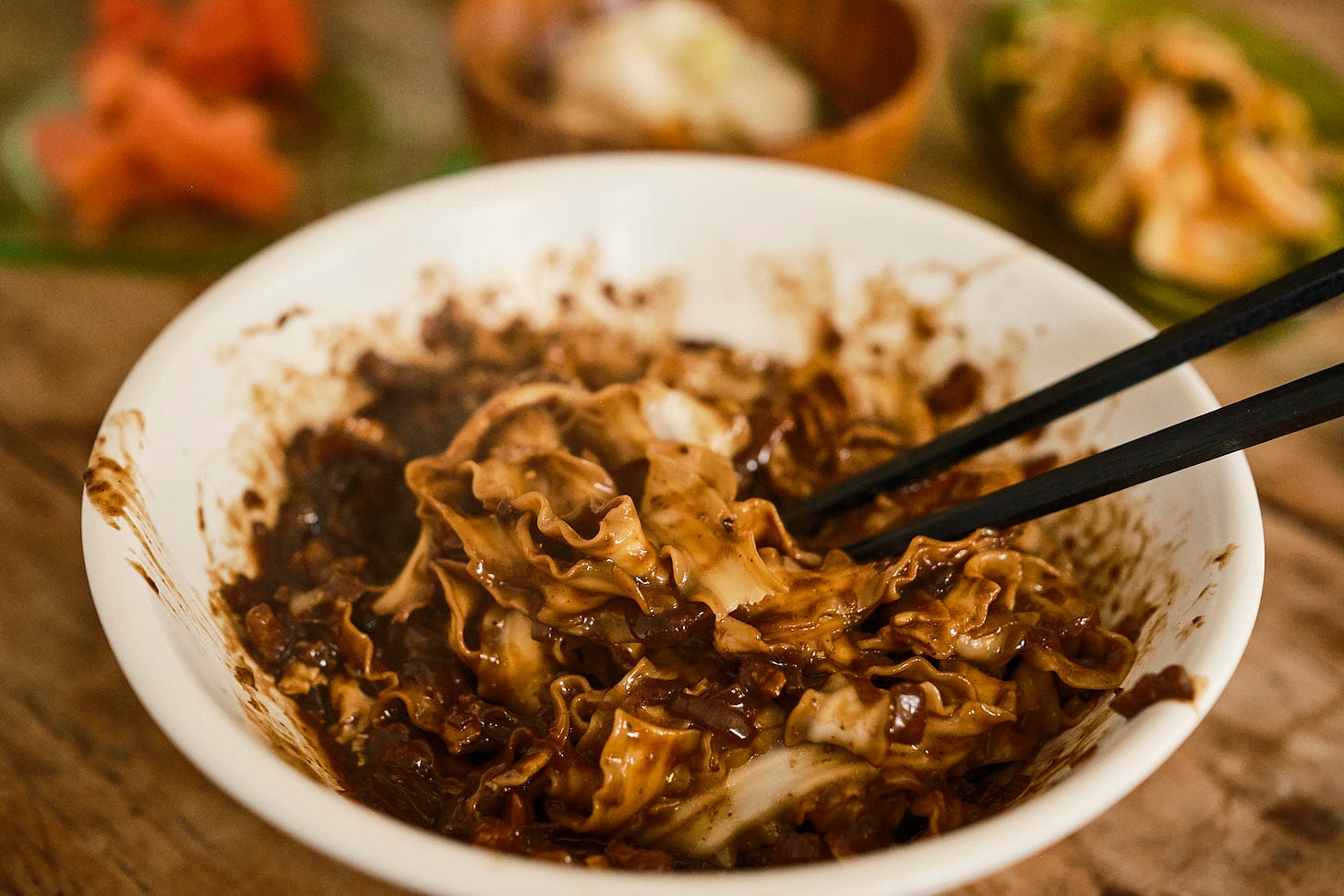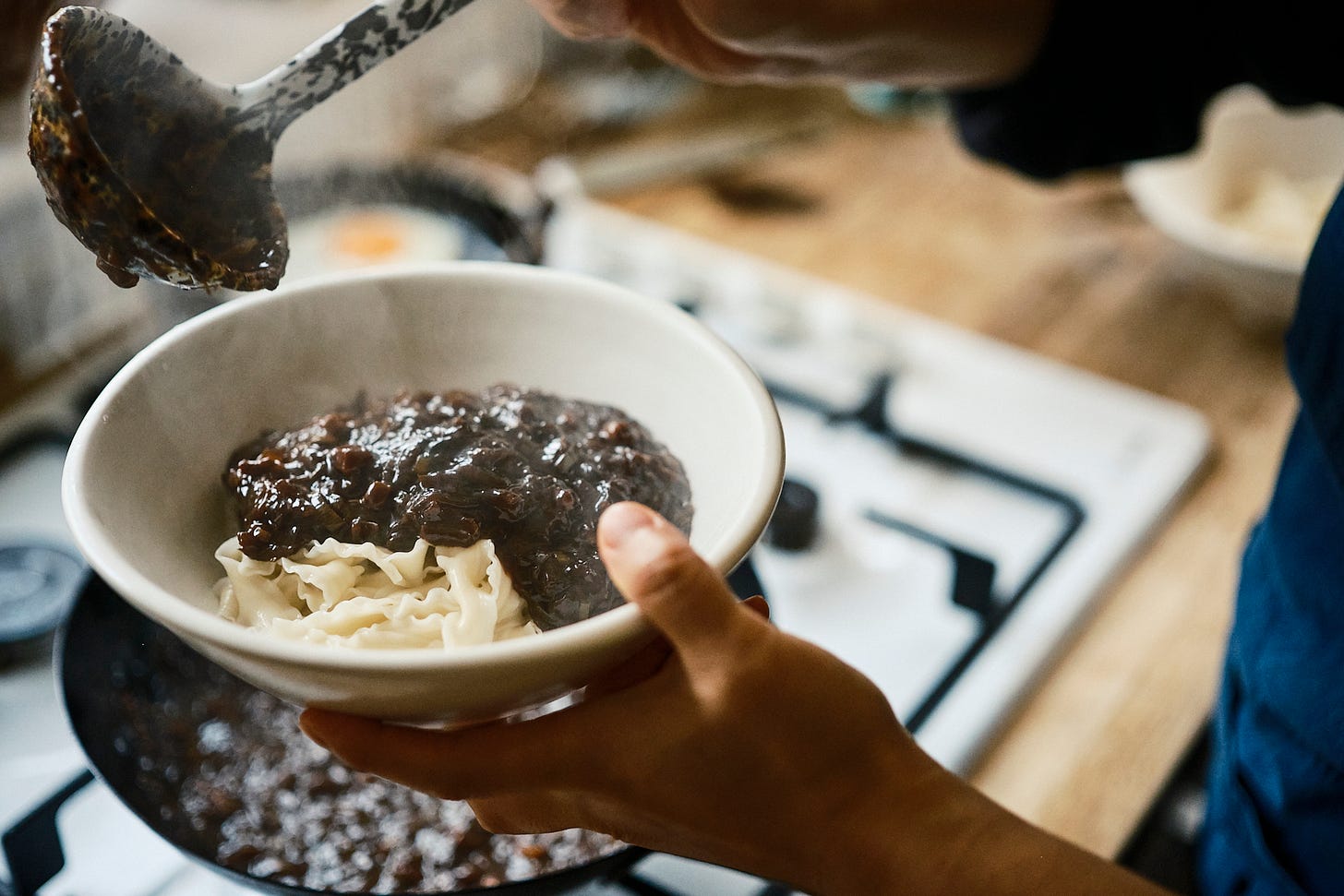Songsoo Kim’s Jjajangmyeon (Pork Belly and Fried Black Bean Noodles)
In her final Noodle Therapy column, Songsoo Kim meditates on memory, migration, and identity through the prism of jjajangmyeon. Photographs by Ben McMahon.
A Vittles subscription costs £5/month or £45/year. If you’ve been enjoying the writing, then please consider subscribing to keep it running. It will give you access to the whole Vittles back catalogue – including Vittles Restaurants, Vittles Columns, and Seasons 1–7 of our themed essays.
Welcome to Vittles Recipes! In this weekly slot, our roster of five rotating columnists share their recipes and wisdom with you. This week’s columnist is Songsoo Kim.
Next week, we are increasing our subscription rate, after almost two years. In that time, we have added Vittles Recipes on Wednesdays and Vittles Restaurants on Fridays, in addition to weekly high-quality deep dives, reportage, cultural histories, and personal essays. We have also continued to increase the rate we pay our contributors. The new subscription rate will be £7/month or £59 for the whole year (representing a 30% discount if you subscribe monthly). If you have been on the fence about whether to get a subscription, then this week is the time to get one. Note: this price increase will not affect current subscribers.
Noodle Therapy: An Anchor through Space and Time
In her final Noodle Therapy column, Songsoo Kim meditates on memory, migration, and identity through the prism of jjajangmyeon. Photographs by Ben McMahon.
Most of my memories of my father are complex, tangled in darkness and distance, but one stands out clearly. It’s a memory from when he had returned to Korea, after being estranged from us, gone for years. When he finally came back to Gwangju, disheveled and unprepared, he ate jjajangmyeon every single day. This struck me deeply, because we hardly ever ate out; we were scraping by, pinching pennies. Watching him indulge in takeout was shocking.
But it was also a rare moment when I felt a strange, deep understanding of him – as my father, but also as a wounded human being. Jjajangmyeon wasn’t even his favourite dish, but, looking back, I realise that there was something more symbolic in his choice. It was about establishing a quiet ritual, a way of reaching for something that grounded him in a place that was both home and yet strangely unfamiliar after so long.
Jjajangmyeon has its roots in the Chinese dish zhajiangmian (炸酱面), meaning ‘fried sauce noodles’. In Korea, it is a dish of wheat noodles served with a sauce made with black beans, pork fat, and onions. A working-class symbol of indulgence, jjajangmyeon is often enjoyed as a small luxury when eating out on special occasions, like after helping friends move or when celebrating a graduation. Brought to Korea by Chinese immigrants from Shandong in the early twentieth century, over time it evolved into a distinctly Korean-Chinese dish, with the saltier tianmianjiang of zhajiangmian replaced with chunjang (춘장), a sweeter black bean paste.
For many people, jjajangmyeon is soul food, evoking comfort and shared memories. When I’m back in Korea, I find myself searching for it, drawn to the sense of familiarity and comfort it brings. It reminds me of how identity – whether Korean or otherwise – is never fixed, but layered and shifting, shaped by the migrations and exchanges that touch all of us. Jjajangmyeon carries that story of movement, of finding ways to belong in places both familiar and foreign. It reflects the journey of so many migrants, caught between worlds, trying to reconcile where they came from with where they find themselves now.
When we lived in the US, I remember Korean-owned Chinese restaurants where jjajangmyeon served as an anchor – a way to hold onto a piece of the past while navigating a new life. For my father, maybe eating jjajangmyeon again in Korea was his way of both celebrating and mourning the years that had passed, tasting something that carried the weight of nostalgia, longing, and perhaps even regret.
I wrote this recipe as I was completing my third visa application in the UK. I was curious why I leaned into this dish, the same one that anchored my father. In a way, jjajangmyeon is a thread connecting the fragmented chapters of his life, and mine, an understated expression of the complexities of distance, return, and identity. It reminds me that sometimes, the simplest rituals – like sitting down to eat a bowl of noodles – can hold the weight of all the places we’ve been, all the parts of ourselves that have been lost and found again.
Jjajangmyeon (Pork Belly and Fried Black Bean Noodles)
This recipe is my own rendition of jjajangmyeon. I’ve added in douchi, a beloved fermented black bean that is used to make mapo tofu, and fry the alliums in rendered pork fat to add depth. The rich, salty black bean sauce, balanced by the subtle sweetness of caramelised onions and leeks, clings to the silky noodles, resulting in a satisfying bite. The addition of a fried egg adds extra richness and harks back to a version of the dish that was popular in some Chinese restaurants in Korea in the late nineties and seems to be coming back into style again. For more freshness, you can add a few julienned cucumbers to bring crunch and a refreshing contrast.







